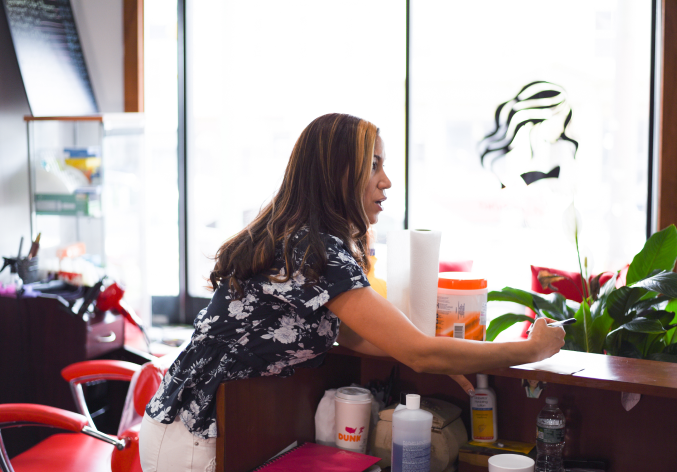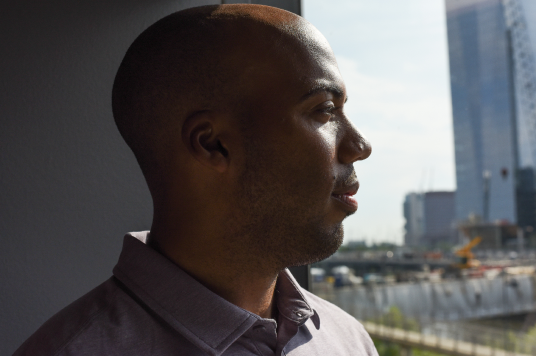About Built by Philly
In early 2020, United Way of Greater Philadelphia and Southern New Jersey, the Philadelphia Department of Commerce, and PIDC launched an initiative to assess the state of the small business ecosystem with Black, Indigenous and People of Color (BIPOC) entrepreneurs.

Florangel Delacruz, LisFlor’s Unisex
Key Findings from the Research:
1. Philadelphia’s small business landscape is not equitable.
Black and Brown business owners have been historically underrepresented; those that do own businesses operate with less revenue than their white counterparts.
2. Small businesses face a severe capital gap.
Demand outpaces the supply of available capital by an estimated $7-8 billion dollars.

3. Small businesses and providers see very different ecosystems.
There is a disconnect between how providers in Philadelphia perceive the ecosystem and how small business owners, particularly BIPOC business owners, perceive the ecosystem.
How small business owners see the ecosystem: Entrepreneurs rely most on peers, friends/family, and professional service providers. Awareness of the organizations in the ecosystem is limited.
Assessing the Ecosystem
In Philadelphia, BIPOC small business owners want to see changes in their access to financing, business advisory services, customers, and the overall ecosystem. The research uncovered core issues within these four categories.

Jason Ray, Zenith Wealth Solutions
Capital Access
- Loans and credit-building resources should be more affordable and more accessible.
- Business owners want more guidance and support to access capital that is available.
- Venture-ready entrepreneurs need more opportunity to secure capital from equity investors.
Business Services
- Business owners want to see services that are more specific, accessible, and representative of BIPOC communities.
- Stronger connections need to be made affordable, high quality professional services.
- Business owners want more opportunities to learn from each other.
Customers and Markets
- A digital presence is vital for small businesses.
- Systemic discrimination limits market opportunities BIPOC entrepreneurs and must be addressed.
- With the right resources, more businesses could tap into contacts and procurement opportunities.
Ecosystem
- Small business owners build Philadelphia. Philadelphia owes its support to small business owners.
- BIPOC entrepreneurs must have a seat at the table to advocate for critical changes.
- Business resources should be easier to navigate.
Building Solutions
The time to act is now. The Philadelphia entrepreneurship ecosystem is at a crossroads with the opportunity to respond to the ongoing impact of COVID-19 and work toward a more equitable environment for the small businesses.
Built by Philly is pursuing collaboration and funding strategies to implement solutions like those below, in partnership with those already working in this space. Additionally, Built by Philly is exploring opportunities for an immediate infusion of local funding to foster economic recovery among the city’s BIPOC-owned small businesses.
Capital Access
This initiative aims to expand funding for flexible grant, debt, and equity capital dedicated to businesses in North, West, and Southwest Philadelphia. The initiative should build upon collaborations like the Pennsylvania CDFI Network and the Kensington Lending Partnership.
This initiative should pair equity investors with other capital and business support organizations dedicated to serving BIPOC entrepreneurs. This initiative should build upon collaborations like the capital subcommittee in the Economy League’s Philadelphia Anchor for Growth and Equity (PAGE) program.
Business Services
These pro-bono consultants should serve as mentors to local entrepreneurs and be members of the city’s small business and corporate communities, bringing business strategy and management skills in support of local entrepreneurs. The ecosystem should partner with CDFIs to facilitate connections with business owners.
This program aims to pair local small business owners together to garner affordable professional services they need while expanding local providers’ book of business. This program should partner with existing BSOs who offer dedicated professional services support and integrate within the city’s professional services associations and networks.
Customers and Markets
Ecosystem Infrastructure
Acknowledgements
This project was made possible with the participation of small business owners and the collaboration of key partners in the Philadelphia entrepreneurship ecosystem. A very special thanks to the 89 small business owners who gave their time and insights to this research through one-on-one or group interviews, and to the 32 business owners who told their stories through video interviews. Thanks to members of the Advisory Council and to leaders of business service and capital organizations who guided and strengthened the research, and to the consultant teams of Next Street, Urbane, SourceLink, and Econsult Solutions, Inc. Finally, thank you to PIDC, the Philadelphia Commerce Dept., and the United Way of Greater Philadelphia and Southern New Jersey for leadership and sponsorship of the Equitable Entrepreneurship Ecosystem Assessment and Strategy.